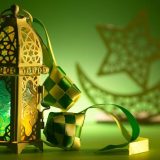Eid Al-Fitr What is it and its relationship to Ramadan
April 21, 2023
Linguistically, “Eid” comes from a verb meaning the return of something time after time. The word itself means a time of returning joy. There are two Eids in Islam, one on the first day of the beginning of the 10th month in the Islamic calendar, “Shawwal,” and the other on the 10th day of the final month of the Islamic calendar. I will elaborate on the latter in a future blog. For further information on determining the new month Shawwal and lunar months in general, please consult this article and my blog at “Working@Chapman.”
Worldwide, Muslims will celebrate on the first day of Shawwal, “Eid-al-Fitr,” marking the end of the month-long obligatory fast during Ramadan. It is a one-day event of joy and renewed hope. For many, it is as if they are starting a new life.
Following the way of the Prophet of Islam, Muhammad (peace be upon him), Muslims will wear new clothing, leave their homes after sunrise, eat dates as a sign they are no longer fasting, and go to a park, a field, a community center, or a mosque, saying in Arabic and in harmony (translation given below),
God is the greatest (Allahu Akbar).
God is the greatest.
There is no deity but God.
God is the greatest.
God is the greatest.
All praises only belong to Him.
They will assemble, pray two units of prayer, and hear a short sermon, reminding Muslims about the importance of consistently performing good deeds. Ramadan is only one month, and good deeds must remain consistent until our respective demises. Some sermons may remind Muslims of their blessings, encouraging them to use them for good. Others may talk about being good to our family and neighbors. Some may incorporate political and current issues plaguing Muslims in China, India, Palestine, and the Levant, reminding them not to forget them in our happiness.
After prayer, Muslims will greet each other with a humble yet impactful statement of “Eid Mubarak (Blessed Eid)” or “May God accept our good deeds.” Many will go to restaurants or visit extended family members and have an excellent breakfast or lunch. Some have dinner parties. Gift-giving in the form of candy, money, usually for children and teenagers, or something else occurs in many families.
Eid can be a challenging time for new converts. Thus, mosques often have programs catered to them, giving them support and inspiration.
The point is to express happiness and proclaim it to each other.
Speaking of happiness, the Fish Interfaith Center will have a post-Eid dinner for the Muslim community at Chapman on Monday, April 24, at 7 PM. If you are interested in attending, RSVP here.
Eid Mubarak, Muslim Community.

